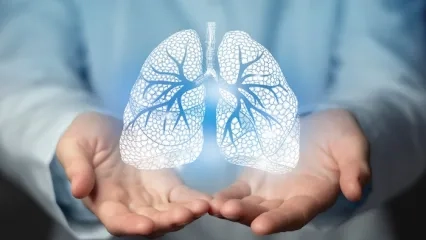Alo Yeditepe
Alo Yeditepe
Smoking Rates Under the Age of 15 Are Increasing
We hear new bad effects of smoking on health and disease. However, smoking statistics continue to increase. Yeditepe University Hospitals Chest Diseases specialist Prof. Dr. Banu Musaffa Salepçi made important statements on May 31, World No Smoking Day.
Smoking Rates Under 15 are Increasing Every Year
Tobacco products and, above all, smoking are becoming increasingly common. According to 2015 data, 942 million men and 175 million women over the age of 15 smoke worldwide. Smoking rates among young people under the age of fifteen are increasing every year. However, it seems that narghile and electronic cigarette use is also becoming widespread, especially among young people. Yeditepe University Hospitals Chest Diseases Specialist Prof. Dr. Banu Musaffa Salepçi stated that the carcinogenic substances found in cigarettes are more common, especially in hookahs and cigars, and that hookah causes 50 times more damage than cigarettes. One hour of continuous hookah smoking is worth 50 cigarettes, and there is significant evidence of chemicals in e-cigarettes that cause DNA damage and mutation.
It Takes the Lives of Close to Six Million People Every Year
Prof. Dr. Salepçi, "Smoking kills about 5.4 million people worldwide every year. “In 2016 alone, 7.1 million deaths (5.1 million men, 2 million women) related to tobacco use were reported worldwide. Of this, 6.3 million are due to active smoking and 884,000 to passive smoking.''
Smokers Who Smoke Less Than 4 Cigarettes a Day Have a 5-fold Increased Risk of Lung Cancer
Reminding that it is known that many types of cancer are linked to smoking, Prof. Dr. Banu M. Salepçi stated that 80-90 percent of head, neck, throat, and lung cancers are related to tobacco use. Salepçi also added:
“The risk of lung cancer increases 20 times in those who smoke 10 or fewer cigarettes a day, and 5 times in those who smoke less than 4 cigarettes a day. Smoking causes cancers of the bladder, pancreas, esophagus, cervix, and acute leukemia in addition to respiratory tract cancers. It also increases the risk of breast cancer and colon cancer. There is definitive evidence that secondhand smoke (passive smoking) also causes lung cancer in adults and strong evidence that it causes upper respiratory tract cancers. Second-hand cigarette smoke has also been shown to cause brain tumors and liver cancer, especially hematological cancers such as leukemia and lymphoma in children. Studies have shown that the risk of brain tumors and leukemia in children is increased in relation to the father's smoking even though the mother does not smoke while pregnant."
The Reason Behind Many Problems, From Copd to School Failure
Reminding that tobacco use is one of the main causes of many diseases other than cancer, Prof. Dr. Banu M. Salepçi said that smoking is the cause of 80-90 percent of COPD, which is the 4th cause of loss of life in the world. Regarding other health risks, Prof. Dr. Salepçi said: “Cardiovascular diseases, which are known as the first cause of death in the world, and brain vascular diseases, which are the second cause of death, are also closely related to tobacco use. It significantly increases the risk of infection and delays wound healing. It is responsible for many diseases such as infertility in women, early menopause, and bone loss, as well as causing infertility and impotence in men. In young people, premature wrinkling of the skin, mouth, and body odor, yellowing of the teeth, weakening of physical activities, and school failure led to many negative consequences. Finally, it has been determined in studies that the Corona virus infection, which has spread worldwide since December 2019, has a more serious course in smokers.
Electronic Cigarettes Create Serious Health Risks
that electronic cigarettes are now being used very widely even among young people who do not think of smoking at all, Prof. Dr. Banu M. Salepçi pointed out that e-cigarettes, which are introduced by the tobacco industry as a harmless tobacco product without smoke, pose a very serious health threat. Regarding the resulting risks, Prof. Dr. explained: “In addition to causing facial, hand, and body burns as a result of the spontaneous explosion, it has been shown to cause COPD in animal experiments, has been proven to cause serious damage to the lungs, and carcinogens have been detected in its vapor and liquid content. Finally, since October 2019, there have been many hospital admissions, intensive care hospitalizations, and deaths in the United States, 70 percent of which were male and 80 percent were young people under the age of 35, with acute respiratory failure due to electronic cigarette use. This disease, called EVALI (Acute lung injury due to e-cigarettes), has led to the death of many young people. In February 2020, there were 2807 cases of EVALI and 68 deaths due to EVALI.
Even Smoking One After Quitting Brings Back the Habit
Yeditepe University Hospital Chest Diseases Specialist Prof. Dr. Salepçi: “The most important thing to consider after quitting smoking is never to take a breath.” Prof. Dr. Banu M. Salepçi explained the reason for this as follows: “Because nicotine receptors in the brain do not disappear after smoking cessation, their number decreases. Even 10 years after quitting, nicotine quickly reaches the brain, binding to existing nicotine receptors and causing them to multiply rapidly. This causes the person to smoke again. When smoking is stopped, starting sports (at least 5 days a week, at least half an hour) significantly reduces the desire to smoke. Apart from this, saving the money given to cigarettes every day by setting a goal, deep breathing exercises or drinking 1 glass of water when there is a desire, brushing teeth immediately after meals, and staying away from sweet and fatty foods also help. But the two most important tricks are to set a quit date and stick to it, and never smoke after you quit.”
Press Coverage: sozcu.com | sabah.com | hurriyet.com | haberler.com | posta.com | winally.com
About
Faculty and Year of Graduation:
İstanbul University, Çapa Faculty of Medicine, 1984
”
See Also
- What is Tuberculosis (TB)? Symptoms and Treatment
- Circadian Rhythm Disorder
- What is Good for Cough? How to Cure Cough?
- What Should Asthma Patients Be Cautious About?
- Does Poor Quality Sleep Increase The Risk of Asthma?
- What is Allergy? What are Allergy Symptoms?
- COPD Makes You Age Early
- It Is Aimed to Eliminate Tuberculosis Worldwide By 2030
- Pollen is Now Seen Outside of Seasonal Changes
- Do Dental Caries Increase the Risk of Pneumonia?
- Inhaling Electronic Cigarettes for a Few Minutes Causes Damage to Vein Wall
- People Who Smoke More Than 25 Cigarettes a Day Have a 50-fold Increased Risk of Lung Cancer
- Can Back Pain Be A Sign of Lung Cancer?
- Nine Out of Ten COPD Patients Do Not Know They Are Sick
- Quitting Smoking Even After Diagnosing Lung Cancer Effects Lifespan
- Electronic Cigarettes Can Cause Heart Attacks!
- Pollen Allergy Has No Season
- Beware of Little-Known Risks of Smoking!
- Lung Cancer
- Does the Pneumonia Vaccine Protect Against the Coronavirus?
- In Case You Are Unable To Sleep Even If You Are Tired, Your Circadian Rhythm May Be Disrupted
Alo Yeditepe




